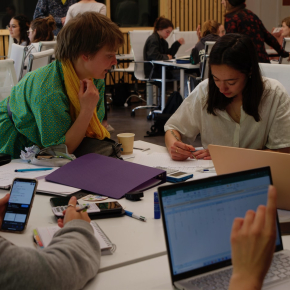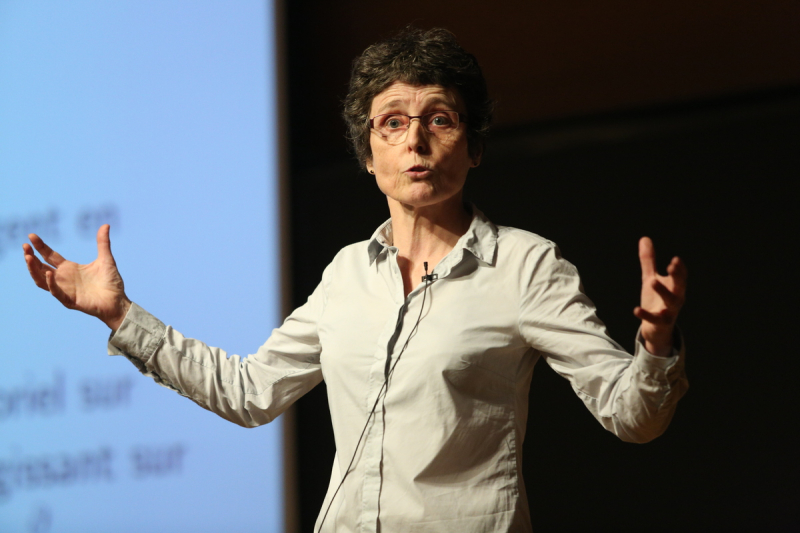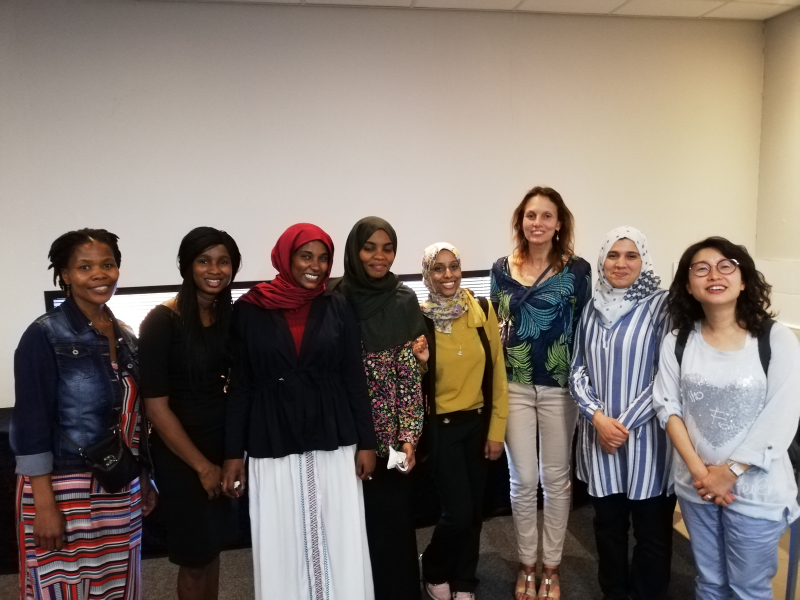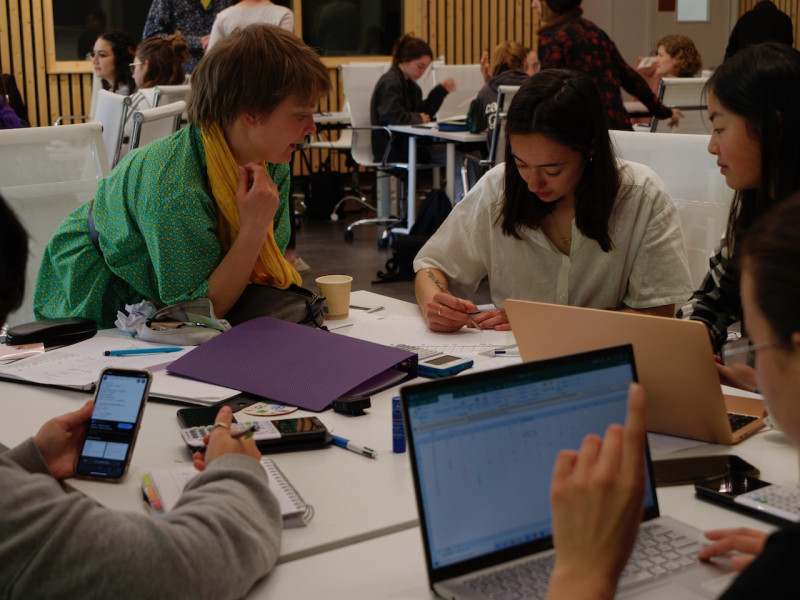
Are women the future of mathematics?
'Matheuses: filles, avenir des mathématiques', an illustrated book combining sociology and mathematics, was published on January 25th 2024. It explains the factors that tend to exclude girls from mathematics. Its publication gives us the opportunity to take stock of strategies to promote parity in mathematics at the CNRS.
Isabelle Chalendar still remembers it all so well. In March 2023, she and her colleagues had organised a gender equality day (French link) for secondary school classes in their laboratory. She is a mathematics professor and gender equality officer at the Laboratory of Analysis and Applied Mathematics (LAMA)1 at Université Gustave-Eiffel. Great was her surprise to hear a schoolboy in a class specialising in mathematics, a predominantly male environment where girls were rarely heard, say that "it's great there are loads of boys studying mathematics so girls can find husbands".
Staggering though this may seem, this type of anecdote highlights the sexist discourse surrounding mathematics in schools, a core subject in 'Matheuses: filles, avenir des mathématiques' (Female mathematicians: girls – the future of mathematics) (French link), a new book illustrated by Claire Marc and published on January 25th 2024 by CNRS Éditions. Claire Marc was previously known for her illustrations for the books Tout comprendre (ou presque) sur le climat (French link) and Tout comprendre (ou presque) sur la biodiversité (French link). An original survey and study enabled the sociologist Clémence Perronnet to show how girls are systematically censored in mathematics. Her co-author Olga Paris-Romaskevich is a mathematician and CNRS researcher at the Marseille Institute of Mathematics2 . She hopes the book will give secondary school girls "the right words to put a name to their social reality and the opportunity to see how the constant denial of their abilities ruins their self-confidence".
Women's weak presence in mathematics research
However, a sea change in this area still seems a long way off despite growing awareness of these issues and some progress having been made during the last decade. Christophe Delaunay, the deputy scientific director (DAS) with special responsibility for gender issues at CNRS Mathematics, has taken stock of the low female presence in his discipline. Between 2011 and 2021, the proportion of female senior lecturers and professors in mathematics at universities only rose from 21% to 22.4% of the overall workforce in French. There was a more significant increase in female research professors - from 16% to 21.5% during the same period. However, Christophe Delaunay qualifies these figures, pointing out that the mathematics community lost 170 posts for academics (French link) (men and women alike) during the same ten-year period. He explains that "it's hard to draw conclusions about recruitment when posts have been cut overall. It's important to obtain more posts and PhD contracts to create an additional lever to help change our practices and make the discipline more inclusive". He considers that the cause of the weak female presence occurs earlier in people's studies with the proportion of girls studying mathematics somewhat resembling an inverted pyramid. There are more or less the same numbers of girls as boys in maths until the secondary school stage and then the female presence very quickly dwindles at each following level. Christophe Delaunay laments the fact that "we lose women the more they progress through their studies",
CNRS Mathematics has reacted to the scale of this phenomenon with a series of national initiatives aimed at encouraging and consolidating female maths research vocations. In 2021 a dedicated website (French link) was set up to centralise documentation on this subject and an initial assessment of parity (French link) was made. Since then the Institute has implemented a proactive policy regarding this issue in terms of financial resources. This initially involved penalising laboratories that did not implement a process of thought about parity and then the launch of a first call for action on parity aimed at laboratories in 2024. It also implemented a proactive human resources policy by setting the target of recruiting a third of women in the mathematics workforce, whatever their status1 , and also worked hard on coordinating the network of gender equality officers and parity committees in its laboratories. This network was launched a few years ago and now includes 100% of the units under the supervisory authority of CNRS Mathematics.
- 1The rate is currently 0.75 to 3.
Raising the awareness of tomorrow's mathematicians
The Institute's gender officers work as close as possible to the field on identifying and combating the factors that exclude women (French link). Isabelle Chalendar was appointed as a gender equality officer in 2016 and has since led a number of initiatives along two complementary lines to promote the female mathematics role models she admits were lacking during her own studies. The first set of initiatives involves hosting colleagues from countries at war (Ukraine) or with a less well developed mathematical research sector (Argentina, Madagascar) while the second involves organising scientific meetings in other countries for local women researchers. A series of meetings were run in Cuba with at least 50% young women from Central America and a CIMPA school1 has been set up in Johannesburg. Isabelle Chalendar also visited the Indian women-only university of Banasthali. When she discusses the low rate of female mathematicians in France with people from other countries her interlocutors are always surprised because they "don't imagine that could happen in France which they see as the country of mathematics" (French link). She and her colleagues at LAMA have also focused on secondary schools with initiatives in schools near the university (French link) to raise awareness of sexism. A gender equality day was run in March 2023 while a play about the life of a fictional female mathematician inspired by real-life women researchers has been performed to secondary school audiences, with more performances scheduled for 2024. They have also gathered and disseminated a series of accounts from female mathematicians and mathematics students and organised visits to the LAMA for predominantly female classes. All these initiatives are designed to counter the lack of female role mathematics models she herself experienced. She believes that "if girls never see women doing mathematics, this has an insidious effect and an undoubtedly negative impact".
As well as gender equality officers, many other scientific outreach initiatives in favour of inclusiveness have been set up. These include 'Les Cigales' (cicadas) (French link), a week-long course to introduce girls to research inspired by MATh.en.JEANS, an association that was awarded the CNRS Scientific Mediation Medal (French link) in September 2023. This course targets first-year secondary school girls and is run biannually at the Centre International de Rencontres Mathématiques in Marseille2 . In the space of four years, the success of 'Les Cigales' has already led to similar projects like 'Les Cigognes' (storks) (French link) in the Lorraine region, 'Les Fourmis' (ants) (French link) in the north of France, 'Les Mouettes Savantes' (scholarly seagulls) (French link) in Brittany and 'Les Marmottes' (marmots) (French link) in Switzerland. The mathematician Olga Paris-Romaskevich co-organised five 'Les Cigales' courses between 2020 and 2023, explaining that she wanted to give secondary school girls "an experience of respect and of working as equals in a positive environment". However she wonders nonetheless about the limits of the format, asking whether "the Cigales trainers can share mathematics without also sharing our sexism?"
- 1The historical activity of the Centre International de Mathématiques Pures et Appliquées (CIMPA) is organising CIMPA Schools in developing countries. Such schools target zones where there is a strong will to develop mathematics and it is possible to develop a viable research project. The aim of CIMPA Schools is to introduce students to an active mathematics research topic. This can be in pure and applied mathematics or a related field like computer science or theoretical physics.
- 2CNRS / Aix-Marseille Université / French Mathematical Society.
Her questioning on such issues gave her the idea of a sociological study of the training course in 2021. She asked Clémence Perronnet, a specialist in scientific culture and author of La bosse des maths n'existe pas (The Knack for Maths Does Not Exist) (French link), to work with the sociologist Alice Pavie on an original survey run during two Cigales courses. With her initial questioning as its starting point, the study involved the observation of exchanges combined with around forty interviews with course participants and led to the development of its own specific themes. The process finally led to the 'Matheuses' book mentioned above written in the framework of an artistic collaboration with Claire Marc. 'Matheuses' highlights the social mechanisms which lead to girls being excluded from mathematics and invites readers to listen to its protagonists - schoolgirls. Finally, this hybrid book also offers exploratory mathematics problems devised by Olga Paris-Romaskevich and slipped in between the sociology chapters.
The mathematician considers this book aimed primarily at secondary school girls to be a real source of hope. In her view, after reading it a secondary school girl might say to herself that 'it's not up to me to change - it's maths that should change. What I can change myself is to do maths in my own way".





